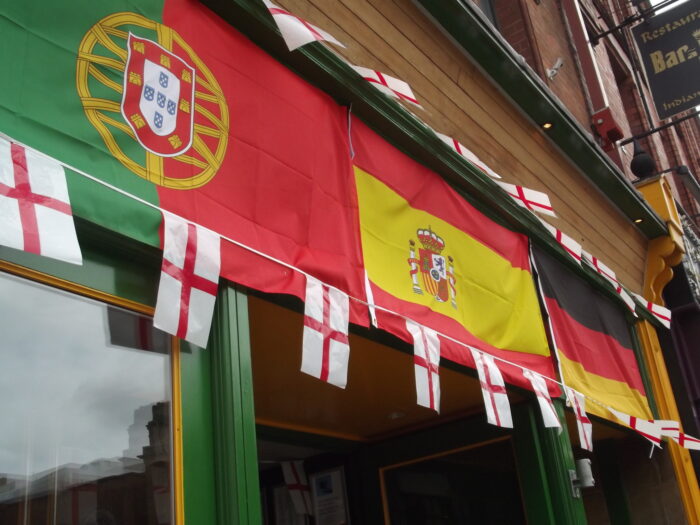Are Spanish and Portuguese Similar? The Answer May Surprise You
How Similar Are Spanish and Portuguese? The Short Answer
According to linguists, there is an amazing 90% lexical coincidence between Spanish and Portuguese, which means that 9 out of 10 words in both languages have direct equivalents. Still, Spanish and Portuguese also have many false cognates or “false friends”, and many differences in pronunciation, such as the existence of nasal vowels in Portuguese.
One of the most common (and for some people, infamous!) language-related misconceptions is that Portuguese is a dialect of Spanish. Although asking ”are Spanish and Portuguese similar?” to a Portuguese speaker might get you into trouble, we get the confusion.
After all, both Portuguese and Spanish belong to the family of the Romance languages. That is why such a big part of their vocabulary looks and sounds alike. That is why we have “jirafa” in Spanish, and “girafa” in Portuguese; or “león” in Spanish and “leão” in Portuguese.
So, are Spanish and Portuguese similar? Of course they are! Being the legitimate daughters of Vulgar Latin, they resemble each other just as if they were two sisters of around the same age. However, this doesn’t mean that they are completely the same. If you look closely, you will find notable differences.

Spanish and Portuguese flags side by side for the 2014 World Cup, via Flickr.
Similar, but different
If Spanish, Portuguese, Italian, and French are Romance languages, why are Spanish and Portuguese more similar than, say, Spanish and French? Well, imagine you have three siblings but, as a young child, you go to live in a foreign land with one of them while the two others are taken to a different place. It’s very likely that, as you grow up, you will have more things in common with the one you’ve been close to all your life than with the other two.
Something similar happened with the Romance languages. Spanish and Portuguese originated in the Iberian peninsula. Then, at some point, they became isolated from the rest of the land by the Pyrenees and, as a result, came to resemble each other in many ways. According to linguists, there is an amazing 90% lexical coincidence between the two languages, which means that 9 out of 10 words in both languages have direct equivalents.
Let’s take a look at a few examples so you can see the similarities and differences between the two of them.
English: Have you booked the hotel?
Spanish: ¿Reservaste el hotel?
Portuguese: Você reservou o hotel?
English: What time is it?
Spanish: ¿Qué hora es?
Portuguese: Que horas são?
English: I like traveling by car.
Spanish: Me gusta viajar en carro.
Portuguese: Eu gosto de viajar de carro.
Very similar, right? But don’t forget: the fact that they are perfectly intelligible with one another doesn’t mean they are the same language. In fact, words like “reserva” and “carro”, which are pronounced with a strong /r/ sound in Spanish, sound very different in some Portuguese dialects, more like “heserva” and “caho”. R, then, although it has the same distribution in the spelling of most words in both languages, has a completely different pronunciation.
Beware of false friends
Are Spanish and Portuguese similar, then? Yes and no. It goes without saying that both languages share a lot (a-lot!) of cognates, i.e., words derived from a common source that retain striking similarities. But the bad news is that Spanish and Portuguese also have many false cognates or “false friends”, as they are usually called.
These are pairs of words that look and sound the same but have a different meaning. You think you know them, but you don’t. Just like a false friend.
English speakers who are also students of Spanish know very well that false friends can create unpleasant misunderstandings. For example, saying that you’re pregnant when you really mean embarrassed. You see, the Spanish word for pregnant, embarazada, looks so much like “embarrassed”, that it’s easy to make this mistake. Well, as it happens, the same kind of problem might arise if you speak both Spanish and Portuguese.
Let’s take a close look at some of the most dangerous false friends from these two languages.
Pelado
This word translates to “bare”, “peeled” or “skinned” in both Spanish and Portuguese. However, in informal speech, pelado shifts its meaning to “a guy who’s shaved his head” in Spanish and “a nude guy” in Portuguese. Do you see how important it is not to overstate the similarities between the two languages?
Polvo
How false can false friends get? Well, just to give you an idea, polvo means “dust” in Spanish and “octopus” in Portuguese. Huge difference, right?
Exquisita/Esquisita
This is a Spanish-English cognate or true friend. In Spanish, it means “exquisite” or “delicious”. However, be careful with its Portuguese equivalent, as esquisita means “strange” or “weird” in this language. Get one letter wrong and you can get into serious trouble.
Rojo/Roxo
If rojo means red, then roxo must mean the same thing, right? Not exactly. Although this word is indeed used to refer to a colour, it’s not the colour you would think it is. Roxo, in fact, means purple, whereas red is vermelho.
So, what’s the final verdict? Are Spanish and Portuguese similar?
Yes, Spanish and Portuguese are very similar, to the point that a Portuguese speaker will have no trouble understanding someone from Spain, Mexico or Argentina. However, it’s important to remember that pronunciation differences and false cognates complicate things and could cause embarrassing misunderstandings.
Do you want to know more about the differences between these two languages? Take a personalised, one-to-one lesson with a native tutor and learn everything there is to know about your target language. Explore our courses now or send us a quick message. We’ll make sure you get a prompt answer.


